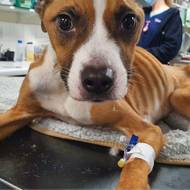
RSPCA reports frightening statistic of one call every four minutes.
New figures released by animal charity RSPCA show the number of animal neglect reports during the first half of 2024 rose by 25 per cent – a problem expected to worsen as people grapple with increased costs associated with Christmas.
There has been a 25 per cent year-on-year increase, with the charity recording 48,814 incidents of cruelty and neglect between January and September 2024, compared to 38,977 during the same period in 2023.
During this time, the emergency line was open 3,276 hours, meaning it took an average of 15 reported incidents of neglect every single hour - or approximately one every four minutes.
RSPCA superintendent Jo Hirst said: “The large 25 per cent increase in the number of pet neglect calls we are taking is a major concern during our busy winter period when many people are facing more financial difficulties, and we fear this upsetting trend will continue.
“One call every four minutes is a frightening statistic. Coupled with this, we have also seen a startling increase in abandonment cases, up 30 per cent in just three years. Sadly, we expect the crisis to worsen as more people tend to struggle with increased costs around Christmas time with presents to buy and extra food shopping - along with energy bills.”
The figures form part of the RSPCA's 'Join the Christmas Rescue' campaign, which aims to raise awareness and funds to help animals suffering from neglect and cruelty, especially during the festive season.
The campaign calls on members of the public to donate, ensuring that rescuers, veterinary teams, branches, and centre staff can continue their vital work even on Christmas Day.
Image (C) RSPCA.



 RCVS Knowledge has called on vet practices to audit their post-operative neutering outcomes.
RCVS Knowledge has called on vet practices to audit their post-operative neutering outcomes.